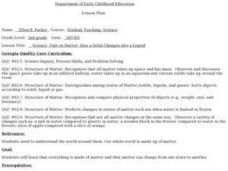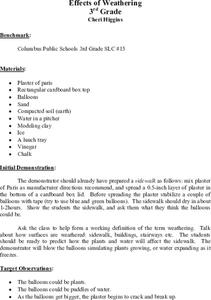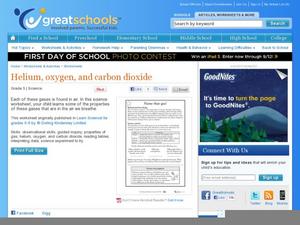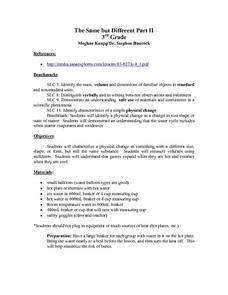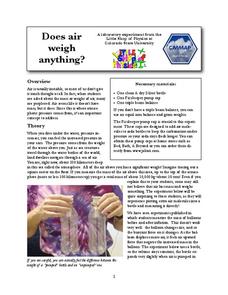Curated OER
Where Are the Dinosaurs?
Students create a dinosaur egg with balloons and newspaper. For this earth science lesson, students explore the extinction of dinosaurs. Students view a web clip and relate it to the extinction of animals they have never seen.
Curated OER
Growing Clean Air Neck Pet
Learners complete a germination activity to explore plants. In this plant science lesson, students create a neck pet that contains germinated seed to learn about the needs of plants. Learners grow the seed inside their plant pet necklace.
Curated OER
See the Wind
Students explore alternative energy sources. In this wind energy lesson, students will investigate the difference in the speed and smoothness of wind at different altitudes above earth. Students will use kites, helium balloons,...
Curated OER
Newton's 3 Laws of Motion
In this Newton's 3 laws of motion instructional activity, students view examples of each law and draw 1 example of each law on their own. Students draw 3 pictures.
Curated OER
How Do Probes Get To Space
Students investigate how force works to propel rockets into outer space. For this physics lesson, students use a drinking straw, fishing line, a balloon, and tape to explore how force works in outer space. Students repeat the experiment...
Curated OER
Flight
Students research flight and to try and put the events of Kitty Hawk into proper perspective. They look at kites, the lateen sail, flight toys (old and new), hot air balloons, propulsion units, hang gliders, and the men who made them.
Curated OER
Kinetic Energy: Car Design
Fourth graders participate in a discussion about kinetic and potential energy. They work in groups to design and construct a car using plastic plates, pencils, rubber bands, card stock and balloons. Students write observations about...
Curated OER
How is Rice Harvested?
Second graders look at how rice is harvested. In this rice harvesting activity, 2nd graders learn vocabulary associated with rice harvesting. They read or listen to a study guide before making Squishy Rice Balls from balloons and rice.
Curated OER
Atmospheric Pressure Interactive Learning Demonstration
Learners predict what happens to the balloon as the water in the flask boils. In this physics lesson, students explain why they made such prediction. After the demo, they give some real life examples of this concept.
Curated OER
Astrophysics Science Project Integrating Research and Education
Learners determine if the particles are coming from above, below, or from one side or the other by using a circular array of scintillators
Curated OER
Science: The Changing Life of Air Pressure
Fourth graders observe demonstrations how heated air rises and becomes a low pressure area. After watching several teacher-conducted experiments, 4th graders, in groups, discuss and answer questions in their journals. Finally, they...
Curated OER
Science-Introduction to the Unit on Matter
First graders gain knowledge about solids, liquids and gases by taking a look at the things around them. They have to classify certain picture cards based on which category they feel the picture falls under. As a whole, the class...
Curated OER
Science: Liquid Matter
Second graders examine the properties of liquids and their classifications. They compare and contrast cups of different liquids and record their findings in journals. Students observe how liquids flow at various speeds and that unlike...
Curated OER
Science: How Solids Become Liquids
Second graders discover how matter changes from one state to another by observing melting ice cubes. They decide on means to warm the ice and predict what will happen. Students record how long it takes for the cubes to melt.
Curated OER
Science: The Shape of Clouds
Learners observe cloud formations during a trip outdoors prior to reading Tomie dePaola's , "The Cloud Book." Using cotton, they make models of the four main cloud shapes and mount them on blue construction paper. As an ongoing project,...
Curated OER
Storms and Extreme Weather
Students explore hurricanes and tornadoes by conducting an experiment. For this weather pattern lesson, students define many extreme weather vocabulary terms and discuss the relationship with static electricity. Students utilize plastic...
Curated OER
Effects of Weathering
Here's a great geology lesson for 3rd graders on weathering and erosion of soil. After a class discussion on how nature can "move a mountain," learners take a look at how a modern phenoma called acid rain can also cause weathering and...
Curated OER
Name That Gas!
Young scientists discover that air is a mixture of different gases - mainly nitrogen and oxygen. The properties of some of the other gases found in oxygen are listed in a table, then learners must decide which one of those gases is...
Curated OER
The Same, But Different Part II
Learners characterize a physical change as something that changes to a different size, but retains its basic substance. They measure volumes using milliliters, and perform an experiment that proves that gases expand when hot and contract...
Curated OER
Papier-Mâché Globe
Paper mache projects are great for using up paper from the recycle bin. Give your class the chance to create a three-dimensional globe out of paper mache. They'll work to make their globes as accurate as possible, adding proper colors...
Curated OER
You've Got to Have Heart
After reading an excellent description of the human heart, fifth graders look at a drawing of a human body, and choose the circle they think represents where the human heart is found. There are four circles inside the character's chest....
Colorado State University
Does Air Weigh Anything?
Can you feel the weight of the air on your shoulders? Your classes may not believe that air has weight. A straightforward experiment asks individuals to weigh a bottle before and after adding air. Their results may surprise them!
Center for Learning in Action
Introduction to the States of Matter
Liquids, gases, and solids are the states of matter in which scholars investigate in a lesson plan that offers in-depth information and engaging activities that look into the three states and the changes their properties make when mixed...
Science Friday
Make a Model Eardrum to Detect Sound Waves
Make sound waves visible with an experiment that asks middle schoolers to build a model ear drum using plastic bottles, rubber bands, plastic wrap, and sand-like substances.













